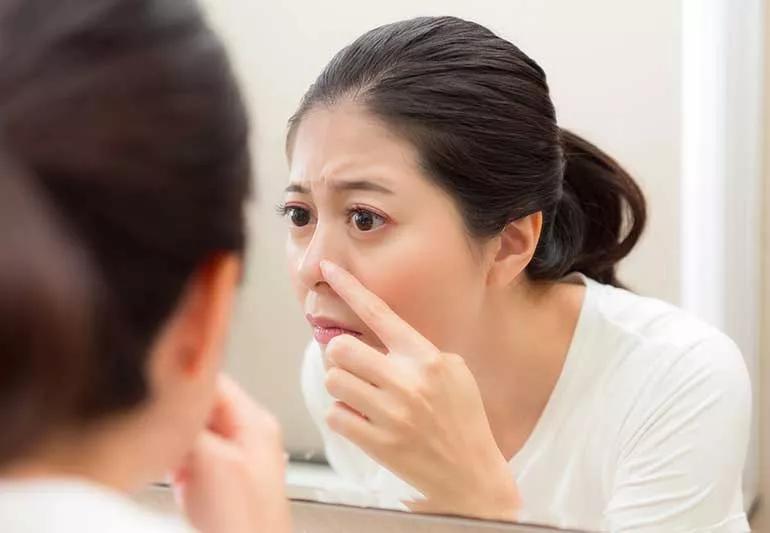Soap, water and an antibiotic ointment are your best bet

Image content: This image is available to view online.
View image online (https://assets.clevelandclinic.org/transform/9cf679cf-d465-47e2-b32a-eff29001b37c/Nose-Ring-Infection-847265166-770x533-1_jpg)
person pressing on tender nostril
A nose piercing is a great way to express yourself, update your look or mark a milestone in your life. But all piercings come with the risk of infection, which isn’t cool if that piercing is in the middle of your face.
Advertisement
Cleveland Clinic is a non-profit academic medical center. Advertising on our site helps support our mission. We do not endorse non-Cleveland Clinic products or services. Policy
Infected piercings are common. Nearly 1 in 4 people with body piercings (except in their earlobes) have had an infection or other medical issue.
“Fortunately, your nose has a rich supply of blood that helps it heal quickly,” says family medicine provider Daniel Krajcik, DO. “Most nose piercing infections are minor and easy to treat at home.”
After getting your nose pierced, you can expect some mild pain, redness and clear fluid that forms a crust. With proper care, those symptoms should get better in a few days.
The main signs of infection around any piercing site, including your ears, belly button or nose, include:
“You shouldn’t have a fever with a mild infection,” notes Dr. Krajcik. “We typically only see a fever with more severe infections. That would be a rare but serious situation and you should immediately seek medical attention.”
The redness and irritation around your nose piercing could be due to an allergy. In fact, allergic reactions to metal piercings are more common than infections, says Dr. Krajcik. An allergic reaction is usually itchy and rash-like, with small, raised, red dots around the area.
Nickel, a metal often used in jewelry, frequently causes allergic reactions. Up to 20% of people may have a nickel allergy.
Advertisement
If you suspect an infection, Dr. Krajcik recommends that you:
Preventing an infection starts with choosing the right place to get your piercing. And don’t try piercing yourself, Dr. Krajcik warns. “The person piercing your nose should wear gloves and use sterilized equipment,” he says. “I recommend walking away if the environment isn’t clean.”
After getting your nose pierced, the highest risk of infection is in the first week. Keeping the area clean during this time is critical:
You may have a higher risk of infection after getting your nose pierced if you have certain health conditions, such as:
Take extra caution to keep the area around your nose piercing clean. Your healthcare provider may also recommend an over-the-counter antibiotic ointment to prevent an infection.
Talk to your healthcare provider if your symptoms don’t get better with at-home treatment or they worsen. “Getting seen sooner is better since severe infections are harder to treat,” states Dr. Krajcik.
The possible complications of an infected nose piercing include:
To clear up an infection, your provider may recommend a nonprescription antibiotic ointment or prescribe an oral antibiotic. Your provider can also figure out if your symptoms are due to an infection or an allergy. If you have an allergy, swapping the piercing for one made of a higher-quality metal should solve the problem.
Advertisement
The 1-2-3 on nose piercings:
With good care, your piercing will heal quickly, and you’ll be rocking your new look.
Advertisement

Sign up for our Health Essentials emails for expert guidance on nutrition, fitness, sleep, skin care and more.
Learn more about our editorial process.
Advertisement
Earlobe piercings heal quicker and are less painful than cartilage piercings — proper cleaning and care are important
It isn’t risk free and shouldn’t replace the aftercare recommended by your piercer
Understand the risks and take precautions against infection
Twice-a-day cleaning with a saltwater solution can help you resolve (and avoid) problems
A dermatologist explains why it happens and how to address it
Infants are at high risk of severe RSV, but getting the vaccine during pregnancy helps protect them from it
Chilblain-like skin lesions and rashes are mild (and rare) complications of many viral infections, not just COVID-19
Yes, but symptoms can be easy to miss
Although it could be used as a moisturizer, this new trend is not recommended
Communicating clear limits helps protect your time, energy and emotional well-being
High cholesterol can be genetic, but testing and treatment can lower your heart disease risk